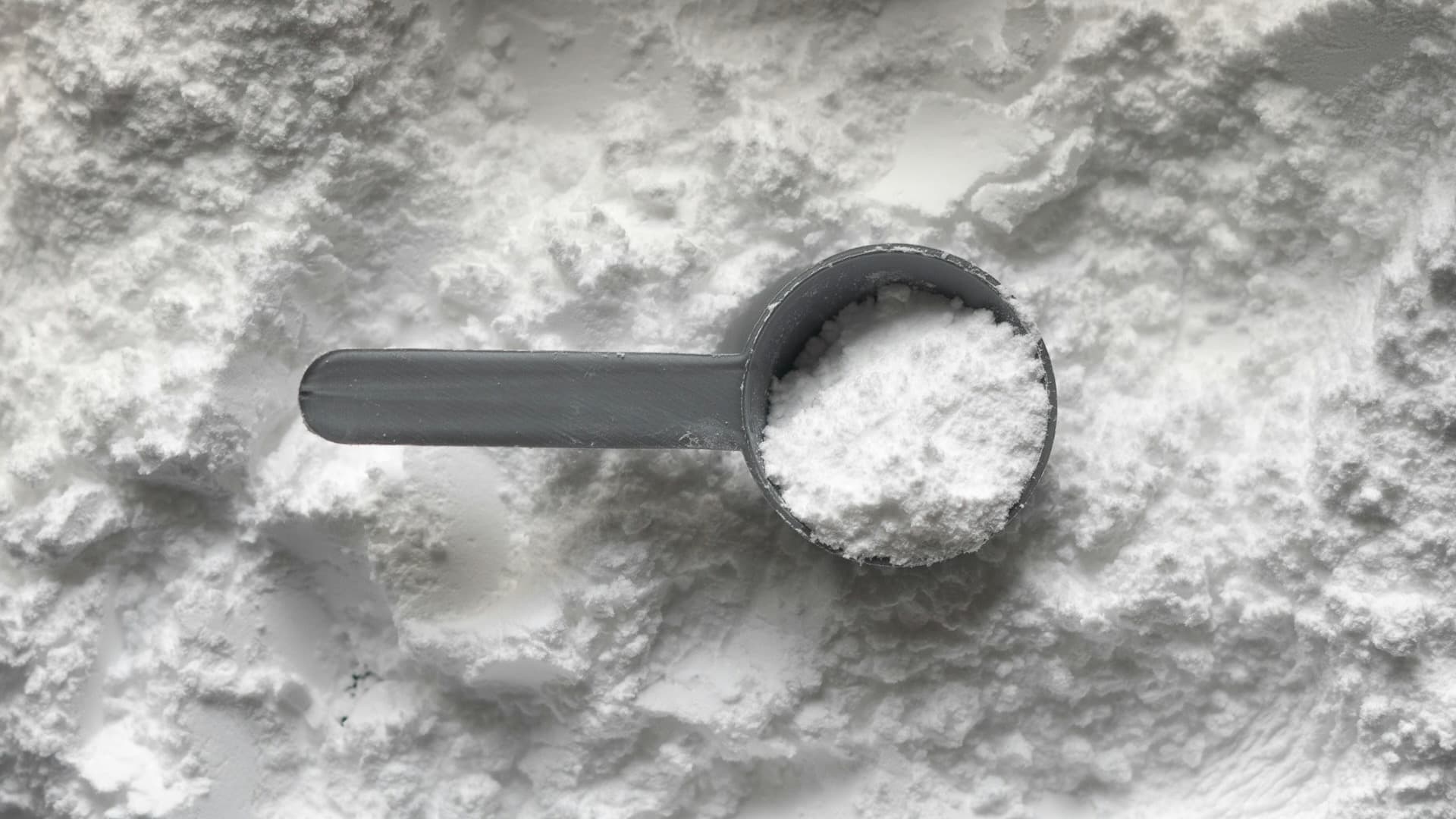
Creatine
Creatine is a naturally occurring compound synthesized in the body and found in foods like red meat and seafood [31]. As one of the most researched nutritional supplements, it is primarily used to enhance athletic performance, promote lean muscle mass, and support overall health [31]. Its application extends beyond athletics, with emerging evidence supporting its role in cognitive enhancement and healthy aging [21].
Creatine's primary physiological function is to enhance cellular energy metabolism [17]. It works by increasing the muscles' stores of phosphocreatine, a molecule that rapidly regenerates adenosine triphosphate (ATP), the body's main energy currency [31][22][12]. This enhanced capacity for ATP resynthesis allows for sustained performance during short, high-intensity activities like sprinting and weightlifting [34][27].
Beyond direct energy production, creatine supports muscle growth through several mechanisms. It draws water into muscle cells, a process known as cell volumization, which may stimulate protein synthesis [12]. It also modulates key anabolic pathways like mTOR, may increase levels of IGF-1, enhances the activity of muscle repair cells (satellite cells), and may reduce levels of myostatin, a protein that inhibits muscle growth [17][10][6][12].
The benefits of creatine are most impactful and well-documented for increasing high-intensity exercise capacity and lean body mass [21][27]. A meta-analysis found that individuals combining creatine with resistance training experienced an 8% greater increase in strength and a 14% greater improvement in performance for maximum repetitions [42]. Its cognitive benefits are also significant, with studies showing improvements in short-term memory and reasoning, particularly in older adults and vegetarians who have lower baseline levels [28][12].
The evidence is less impactful regarding bone health. While some studies suggest creatine combined with resistance training may slow bone mineral loss, meta-analyses have not consistently shown significant increases in bone mineral density [25][22][33]. Similarly, while its therapeutic potential for neurodegenerative diseases is being investigated, clinical trials in humans have yielded inconsistent results [34][38].
A typical and effective implementation of creatine supplementation uses creatine monohydrate, which is the most studied and recommended form [21][27]. Other, more expensive forms have not been shown to be more effective [11][4].
A common protocol involves two phases:
- Loading Phase: To rapidly saturate muscle stores, an individual consumes 20–25 grams per day for 5–7 days, typically split into four or five smaller doses [2][14]. This phase is effective but not strictly necessary [2].
- Maintenance Phase: Following the loading phase, a daily dose of 3–5 grams is sufficient to keep muscle stores saturated [21][20]. Larger individuals may benefit from up to 10 grams daily [18][40].
Alternatively, one can skip the loading phase and start with a 3–5 gram daily dose. This will achieve full muscle saturation, though it will take approximately 28 days [2][40]. For cognitive benefits, a dose of around 5 grams per day is generally recommended [23][29].
A common pitfall is experiencing minor gastrointestinal discomfort, especially during the high-dose loading phase [9]. Another is the practice of "cycling" off creatine, which is not supported by evidence and can decrease muscle stores, potentially hindering performance gains [37]. Continuous daily supplementation is generally recommended.
Pros
Excellent Safety Profile: Extensive research, including long-term studies of up to five years with doses as high as 30 grams per day, has found creatine to be safe and well-tolerated in healthy individuals [9][2]. The International Society of Sports Nutrition (ISSN) regards it as one of the most beneficial sports supplements available [9][41].
Benefits for Aging and Women: It is a well-supported strategy to counteract age-related declines in muscle mass and strength [1][17]. Women may experience unique benefits, including support for mood and cognition during menopause and potentially greater performance increases due to naturally lower creatine stores [21][3][19].
Cons
Contraindications: Supplementation should be avoided by individuals with pre-existing kidney disease [1][24][32]. Due to a lack of long-term studies in developing bodies, major medical bodies advise against its use for individuals under 18 [13][15]. It is also not recommended for pregnant or nursing women [9].
Does creatine cause dehydration and muscle cramps?
Does creatine cause hair loss?
Does creatine damage the kidneys?
Is creatine a steroid?
No. Creatine is a naturally occurring compound made from amino acids and is found in the body and in food. Anabolic steroids are synthetic hormones. Creatine is considered a safe and beneficial supplement by major sports nutrition bodies [9].
Will creatine cause women to "bulk up"?